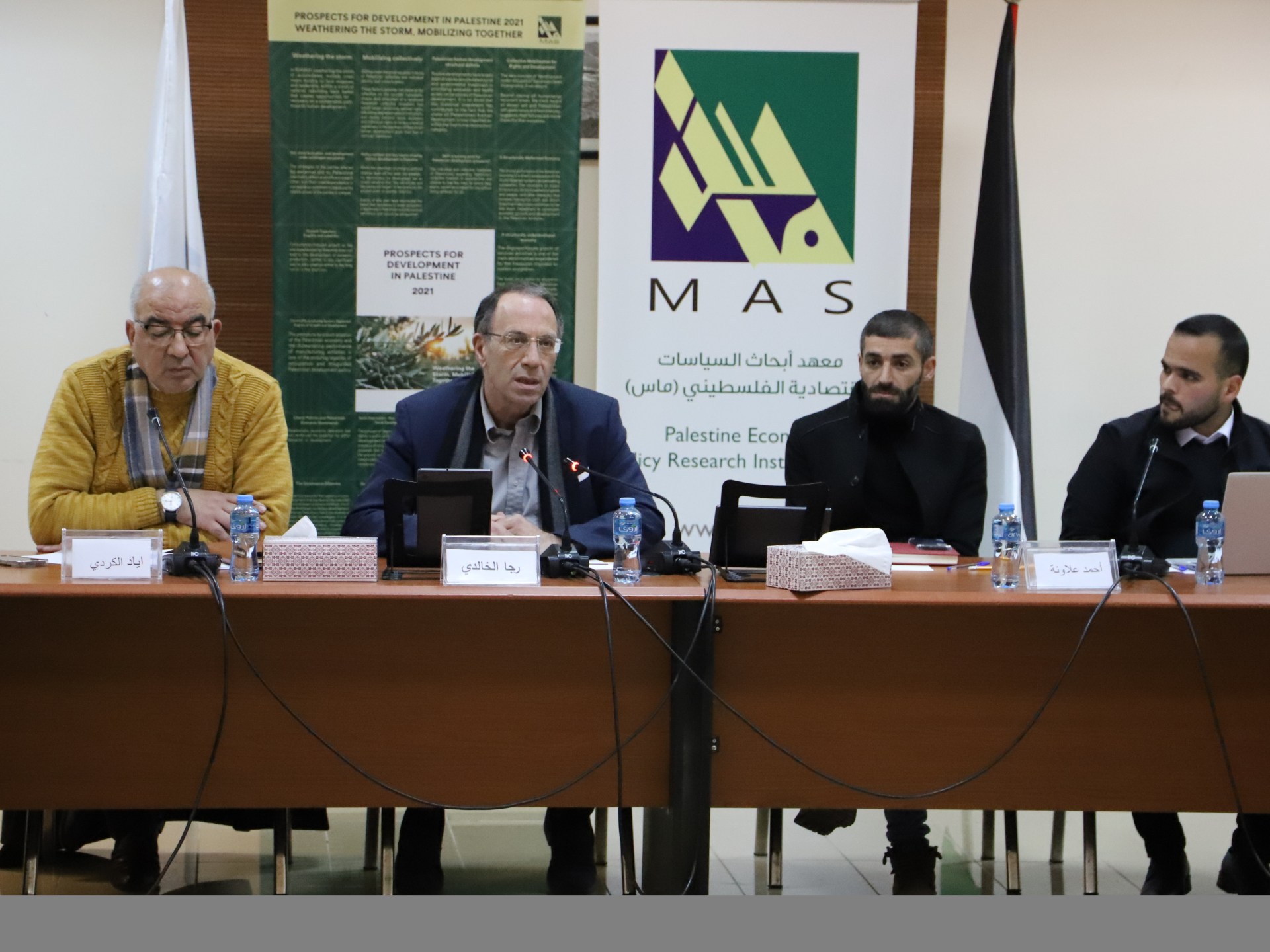The Palestinian Economic Policy Research Institute (MAS) discussed the economic impact of the Israeli aggression on Jenin and Nablus.
Experts and analysts discussed the economic impact of the Israeli aggression on the cities of Jenin and Nablus, and discussed the required response and solidarity policies, in a special consultation session hosted by the Palestinian Economic Policy Research Institute (MAS) entitled “The economic impact of the Israeli aggression on Jenin and Nablus... the required response and solidarity policies.”
Specialists spoke at the institute’s headquarters and via the “Zoom” application, and the discussion touched on the economic repercussions of the Israeli aggression, and the researchers at “MAS” Ahmed Alawneh and Sabri Yaqouba presented their visions on the subject, in addition to interventions from the President of the Jenin Chamber of Commerce and Industry, Ammar Abu Bakr, and the Secretary of the Chamber of Commerce. And Nablus industry, Iyad Al-Kurdi, and the representative of the municipality of Hawara, Rana Abu Haniyeh.
MAS Director General Raja Al-Khalidi stressed the importance of researching the economic realities resulting from the Israeli aggression, which is not limited to Jenin and Nablus, but extends to all Palestinian governorates. Al-Khalidi stressed the need for clear opinions and demands from participants to formulate political recommendations for decision-makers.
He explained that MAS completed 10 diagnostic and analytical economic summaries on the repercussions of the Israeli aggression on both the Gaza Strip and the West Bank, according to a report of which Al Jazeera Net obtained a copy.
Critical numbers
The city of Jenin and its camp witnessed the most violent military campaign in July 2023 and since 2002 in the West Bank. Economic losses amounted to between 18 and 20 million dollars, including 12 million dollars in damage to private and public buildings, 5 million dollars to the road network, and 3 million dollars to the infrastructure and water network. Nearly 80% of the camp’s buildings were completely or completely damaged. Partial.
The water and electricity networks were almost completely destroyed, 3 hospitals were targeted, and thousands of citizens were displaced within the city, while the movement of industry, trade, and services stopped. In addition, the entry of goods was prohibited due to the closure of the Jalama checkpoint.
The effects of bulldozing and destruction in the streets of Jenin camp as a result of the Israeli invasion (Al Jazeera)
Since the beginning of the aggression on the Gaza Strip, economic losses have continued to mount, leading to a weakening of citizens’ purchasing power, adding to Jenin’s monthly losses of about $24 million.
The city of Nablus, which is considered the economic capital of the northern West Bank, has also faced a significant decline in various economic activities since October 7, 2023. The city, which is usually bustling with shoppers and visitors, has witnessed a decline in the number of visitors daily from 100,000 to 15,000 visitors. An-Najah National University switched to distance education, affecting about 25,000 students, both male and female.
Economic establishments in the city suffered a decline in purchasing power by 90%, while 96% of them witnessed a decline in monthly sales and revenues. About 85% of industrial facilities witnessed a decline in production capacity, and about 8% were exposed to direct damage as a result of attacks by settlers and occupation forces.
In Howara, purchasing power decreased to 85%, damaged goods increased to 80%, and monthly revenues decreased by 80%. Rana Abu Haniyeh highlighted the plight of Hawara, which has been suffering from settlement encroachments since 2019, which led to the confiscation of lands and the destruction of homes and shops. With the beginning of the Israeli aggression on October 7, approximately 450 stores closed their doors, and visitors were prohibited from entering the town.
A call for urgent interventions
Participants stressed the need for concerted efforts to reduce the economic impact on the two cities, calling for the adoption of strategies for reconstruction in Jenin in particular.
The speakers also stressed that these cities are not the only ones facing a fierce occupation campaign, but rather the campaign affects all Palestinian governorates. Participants stressed the need for urgent interventions, especially from the Palestinian government. It was proposed to establish a national compensation fund as a potential solution to alleviate the severity of the crisis and mitigate its negative impact on citizens.
Source: Al Jazeera

